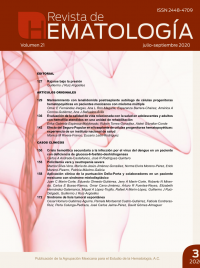Efecto del Seguro Popular en el trasplante de células progenitoras hematopoyéticas: experiencia de un instituto nacional de salud
Rev Hematol Mex. 2020; 21 (3): 142-149. http://doi.org/10.24245/rev_hematol.v21i3.3995
Mónica M Rivera-Franco, Eucario León-Rodríguez
Hematology and Oncology Department, Instituto Nacional de Ciencias Médicas y Nutrición Salvador Zubiran, Mexico City.
Abstract
BACKGROUND: In 2004, a Universal Healthcare System was established in Mexico in order to protect most patients from catastrophic expenditures. Hematopoietic stem cell transplantation (HSCT) has been covered since 2015 at our center, a national health institute.
OBJECTIVE: To analyze the impact of the Seguro Popular in HSCT in adults at one of the referral centers of this system.
PATIENTS AND METHOD: A retrospective analysis of patients undergoing HSCT with and without financing by the Seguro Popular at a national institute of health in Mexico City performed from January 2011 to December 2018.
RESULTS: There were included 194 patients. The mean number of HSCT performed annually before and after Seguro Popular was similar. No differences were observed in non-relapse mortality. The 2-year disease-free survival and overall survival were similar before and after Seguro Popular for both, autologous and allogeneic/haploidentical HSCT.
CONCLUSIONS: Although Seguro Popular has eliminated some important expenses generated mainly by the in-patient procedure, it still has deficiencies that should be solved in order to achieve an optimal universal healthcare coverage in Mexico. Further studies should be performed focusing on other expenses and more importantly, the other two affiliated centers to the Seguro Popular should publish their results for further comparisons.
KEYWORDS: Hematopoietic stem cell transplantation; Mexico; Universal healthcare.
Resumen
ANTECEDENTES: El 50% de los mexicanos vive en pobreza, por lo que la seguridad social es limitada. Sin embargo, a partir de 2004 se estableció un sistema universal de salud para proteger a los pacientes de gastos catastróficos. El trasplante de células progenitoras hematopoyéticas comenzó a ser subsidiado 11 años después en nuestro centro.
OBJETIVO: Analizar el efecto del Seguro Popular en pacientes adultos a quienes se les efectuó trasplante de células progenitoras hematopoyéticas en uno de los tres centros de referencia de este programa.
PACIENTES Y MÉTODO: Análisis retrospectivo de pacientes a los que se les hizo trasplante de células progenitoras hematopoyéticas con y sin el Seguro Popular en el Instituto Nacional de Ciencias Médicas y Nutrición Salvador Zubirán, efectuado de enero de 2011 a diciembre de 2018.
RESULTADOS: Se incluyeron 194 pacientes. El promedio de trasplantes de células progenitoras hematopoyéticas realizados por año antes y después del Seguro Popular fue similar. No se encontraron diferencias en mortalidad asociada con el trasplante. Asimismo, la supervivencia libre de enfermedad y la supervivencia global a dos años fueron similares entre ambos grupos, tanto en TCPH autólogos como alogénicos/haploidénticos.
CONCLUSIONES: Aunque el Seguro Popular ha eliminado gastos importantes para los pacientes, sobre todo durante la hospitalización, aun tiene deficiencias que deben ser resueltas para alcanzar una cobertura óptima y se requieren más estudios para hacer comparaciones.
PALABRAS CLAVE: Trasplante de células progenitoras hematopoyéticas; México; Cobertura universal.

